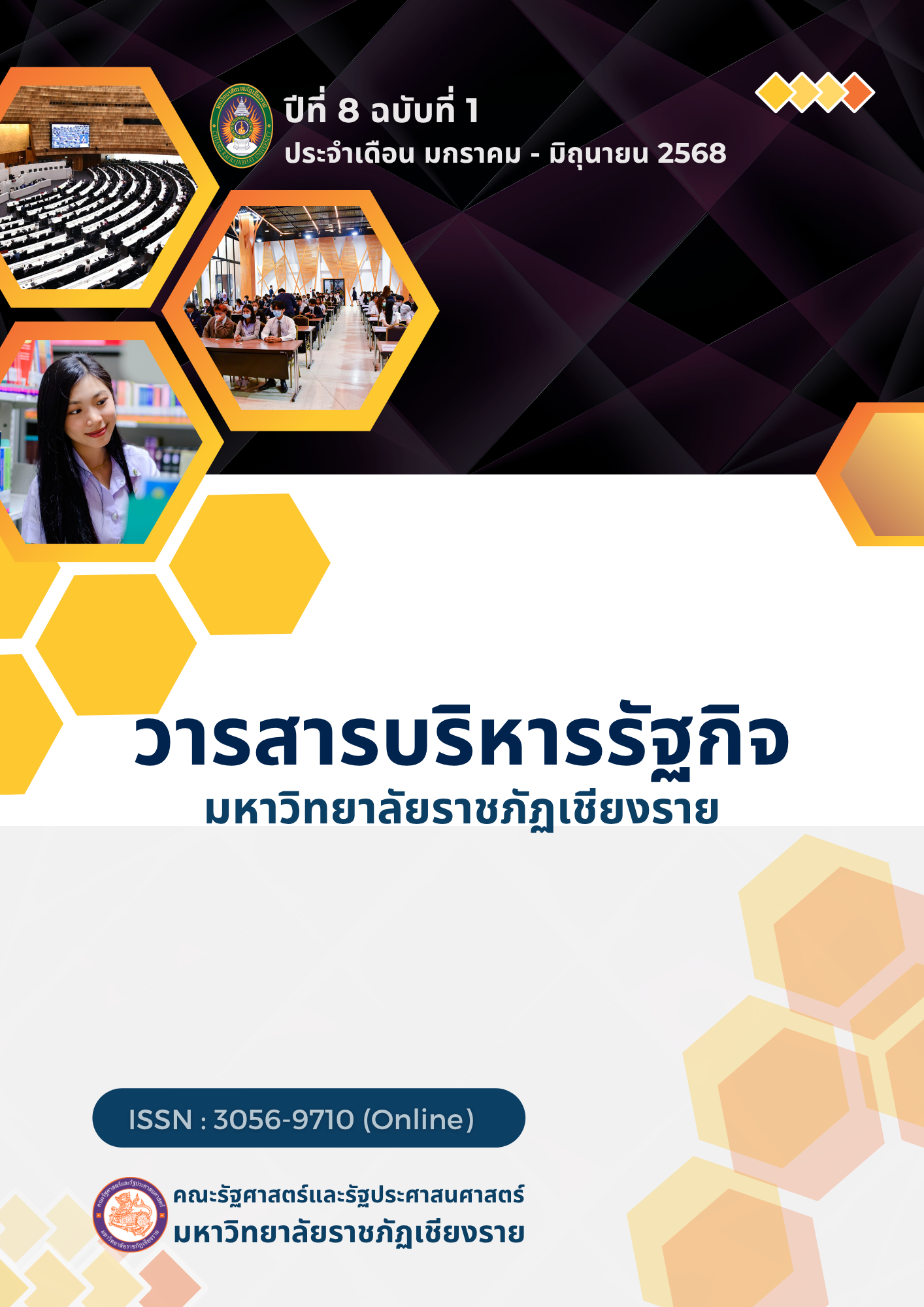Best Practices for Solid Waste Management of a Zero Waste Model Community: A Case Study of Ban Huai Nam Khun Village No. 17 Mae Fa Luang Subdistrict Mae Fa Luang District Chiang Rai Province
Main Article Content
Abstract
This research aims to: 1) study the waste management process in the Baan Huai Nam Khun community, Village No. 17, Mae Fah Luang Subdistrict, Mae Fah Luang District, Chiang Rai Province, and 2) identify success factors in waste management in this community. The results indicate that the community waste management process follows the POLC management theory, including: (1) Planning: Community leaders plan initial waste management steps, primarily waste sorting into four categories following the 3R principle. (2) Organizing: All members are assigned roles in waste sorting and managing their own household waste, and a waste management committee has been established within the community. (3) Leading: Community leaders and the waste management committee encourage awareness among members and promote participation in waste management-related activities. (4) Controlling: The community places importance on evaluating outcomes and inspections, with support from the Mae Fah Luang Subdistrict Administration Organization for planning assistance and meetings.
Success factors include both internal and external components. Internal factors are (1) adherence to the POLC waste management process, (2) dedicated community leaders prioritizing the issue, and (3) strong community cooperation. External factors are (1) continuous support from local administrative organizations, providing knowledge and budgeting for problem-solving and data collection to aid analysis, contributing to the success of community waste management, and (2) the sustainability of waste-free community practices, including source waste reduction, recycling, reuse, and public campaigns promoting correct waste separation. Knowledge dissemination on waste management practices is also emphasized.
Article Details
References
กรมควบคุมมลพิษ. (2564). ปัญหาสิ่งแวดล้อมจากขยะมูลฝอย. สืบค้นจาก http://pcd.go.th/info_serv/waste_rubbish.htm
กิตติ มีศิริ. (2559). ปัจจัยแห่งความสำเร็จในการจัดการขยะมูลฝอยโดยชุมชน: กรณีศึกษาชุมชนเกตุไพเราะ 3,4,5 เขตพระโขนง กรุงเทพมหานคร. การค้นคว้าอิสระ หลักสูตรรัฐศาสตรบัณฑิต, กรุงเทพฯ: มหาวิทยาลัยธรรมศาสตร์.
จารุณี วงค์สี. (2549). ทุนทางสังคมกับการจัดการขยะมูลฝอย : กรณีศึกษาชุมชนวัดกลาง เขตบางกะปิ กรุงเทพมหานคร. วิทยานิพนธ์ พัฒนาชุมชนมหาบัณฑิต. กรุงเทพฯ: มหาวิทยาลัยธรรมศาสตร์.
สิทธิสมบูรณ์ เจริญพาณิชย์พันธ์. (2555). กระบวนการจัดการขยะอินทรีย์ฐานศูนย์ในชุมชนเกตุ ไพเราะ 3-4-5 เขตพระโขนง กรุงเทพมหานคร. วิทยานิพนธ์ หลักสูตรพัฒนาชุมชนมหาบัณฑิต, กรุงเทพฯ: มหาวิทยาลัยธรรมศาสตร์.
องค์การบริหารส่วนตำบลแม่ฟ้าหลวง. (2567). สภาพทั่วไปและข้อมูลพื้นฐานขององค์การบริหารส่วนตำบล. สืบค้นจาก https://www.maefaluang.go.th/data.php?id=2
อรณิชชา คชนา. (2562). การบริหารจัดการงานสวนป่าในโรงเรียน. วิทยานิพนธ์หลักสูตรปรัชญาดุษฎีบัณฑิต, กรุงเทพฯ: มหาวิทยาลัยศิลปากร.


